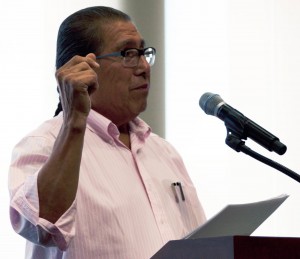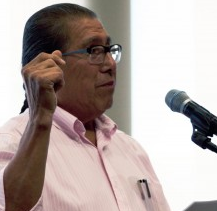Former Associate Professor of Southwest Minnesota State University Chris Mato Nunpa warned students that his speech would be controversial in his Dakota-U.S. War of 1862 presentation Thursday, Sept. 13, in Woulfe Alumni Hall.
“The things I say… other people consider pretty harsh,” Nunpa said, “and I don’t mean to be like that because to me, I speak the truth.”
The speech, titled “The Truth Shall Make You Free: A Dakota Perspective on Genocide, the Dakota-U.S. War of 1862, and Truth-Telling,” was inspired by the war’s 150th anniversary.

“For these past 150 years, there has not been much truth-telling of what really happened in the state of Minnesota with the Dakota people,” Nunpa said.
He explained that the Dakota population was depleted from 16 million to 237,000 and many were tortured, taken from their families and sent to concentration camps in Minnesota during the war.
“That’s very good killing, very efficient killing on the part of the United States,” Nunpa said.
Freshman Hannah Ramsey said she thought Nunpa’s speech was jarring.
“He was a lot more straightforward than I thought,” Ramsey said. “I knew he would talk about persecution of the Dakota people, but he really didn’t hold back on any of his opinions.”
Nunpa also emphasized his negative experiences with Christianity throughout his childhood and adult life.
“I had learned that these ‘Christians’ could say the most horrible things about our Dakota people and our spirituality and our ceremonies,” Nunpa said. “They would call us heathens or savages and say that our Dakota people and other indigenous peoples were ‘lost in our darkness.’”
Nunpa humorously highlighted his go-to response to Christians.
“So now, I don’t mind saying to white Christians somewhat facetiously and somewhat seriously that ‘once I was lost in the darkness of Christianity, but now I have entered into and walk in the light and beauty of Dakota spirituality,’” Nunpa said.
Freshman Ben Dymit said he felt uneasy about some of Nunpa’s claims.
“When he first started talking, I really liked him. I definitely saw where he was coming from, but once he started bashing Christianity … it was really uncomfortable,” Dymit said.
Nunpa also claimed that many colleges and universities, in particular, some from the MIAC, are planted on Dakota soil that was never paid for.
“Also, a number of higher education institutions are on this land: Metro State University, Hamline University, St. Thomas University, Macalester College, the University of Minnesota and others. What ought to be their role in paying for the land?” Nunpa questioned.
Even though St. Thomas is a Catholic university, Dymit and Ramsey agreed that hearing differing opinions is important.
“Being a freshman … you think, ‘Oh, it’s a Catholic university,’ so to have this speaker and to have that opinion that seems so different than the Catholic opinion, it’s kind of nice because it goes against the stereotype,” Ramsey said.
Nunpa ended the presentation by calling for action, not reconciliation, from Minnesotans.
“One of my goals is to work for mutual respect instead of reconciliation,” Nunpa said. “The white man must now begin to acknowledge and tell the truth.”
Dymit said he left the presentation with a positive attitude.
“It was definitely eye-opening,” he said. “I enjoyed it overall.”
Baihly Warfield can be reached at warf3860@stthomas.edu.

